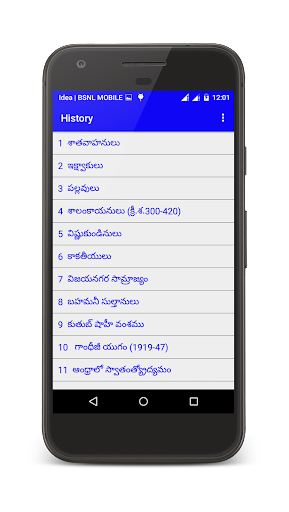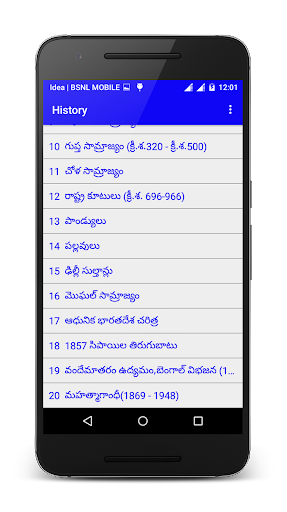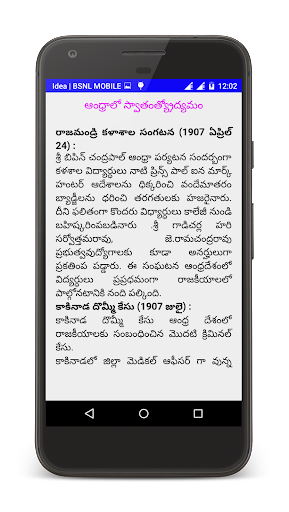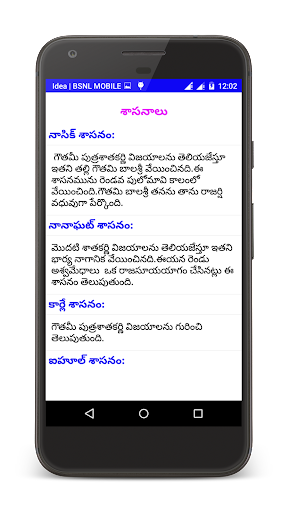-This app contains India,AP and TS History related topics.
-This app contains India , Telangana and AP history related bits.
Pre-Historic India
The Indian subcontinent has a rich and diverse history dating back to prehistoric times. The earliest known human settlements in India date back to the Paleolithic era, around 2 million years ago. These early humans were hunter-gatherers who lived in caves and rock shelters. Over time, they developed tools and techniques for hunting and gathering food, and they also began to domesticate animals.
Indus Valley Civilization
Around 2600 BCE, the Indus Valley Civilization emerged in the northwestern part of the Indian subcontinent. This civilization was one of the world's first major civilizations, and it flourished for over a thousand years. The Indus Valley people were skilled farmers, engineers, and artisans. They built cities with well-planned streets and houses, and they developed a written language.
Vedic Period
Around 1500 BCE, the Aryans, a nomadic people from Central Asia, migrated to the Indian subcontinent. The Aryans brought with them their own language and culture, which had a profound impact on Indian history. The Vedic period, which lasted from 1500 to 500 BCE, saw the development of the Vedas, the sacred texts of Hinduism.
Mauryan Empire
In the 4th century BCE, Chandragupta Maurya founded the Mauryan Empire, which became one of the largest empires in Indian history. The Mauryan Empire was a period of great cultural and economic prosperity. The empire was divided into provinces, each of which was ruled by a governor. The Mauryans also developed a system of roads and canals, which facilitated trade and communication.
Gupta Empire
The Gupta Empire, which ruled from the 4th to the 6th century CE, was another period of great cultural and economic prosperity. The Gupta period saw the development of Indian art, architecture, and literature. The Gupta Empire was also a major center of learning, and many scholars from around the world came to study at its universities.
Medieval India
The medieval period in Indian history saw the rise and fall of many different empires. The Delhi Sultanate, which ruled from the 12th to the 16th century, was a period of Muslim rule in India. The Delhi Sultanate was followed by the Mughal Empire, which ruled from the 16th to the 19th century. The Mughal Empire was a period of great cultural and economic prosperity, and it saw the construction of many beautiful buildings, including the Taj Mahal.
British Rule
In the 18th century, the British East India Company began to acquire territory in India. By the mid-19th century, the British had established control over most of the Indian subcontinent. British rule in India had a profound impact on Indian society and culture. The British introduced new technologies and ideas, and they also imposed their own system of government and law.
Indian Independence
In 1947, India gained independence from British rule. The Indian National Congress, led by Mahatma Gandhi, played a key role in the independence movement. After independence, India became a republic, and it adopted a new constitution.
Modern India
Since independence, India has made significant progress in many areas. The country has developed a strong economy, and it has become a major player in world affairs. India is also a vibrant democracy, and it has a rich and diverse culture.
Conclusion
Indian history is a long and complex one. The country has seen many different empires and dynasties, and it has been influenced by many different cultures. Today, India is a modern and prosperous nation, and it is a major player in world affairs.
-This app contains India,AP and TS History related topics.
-This app contains India , Telangana and AP history related bits.
Pre-Historic India
The Indian subcontinent has a rich and diverse history dating back to prehistoric times. The earliest known human settlements in India date back to the Paleolithic era, around 2 million years ago. These early humans were hunter-gatherers who lived in caves and rock shelters. Over time, they developed tools and techniques for hunting and gathering food, and they also began to domesticate animals.
Indus Valley Civilization
Around 2600 BCE, the Indus Valley Civilization emerged in the northwestern part of the Indian subcontinent. This civilization was one of the world's first major civilizations, and it flourished for over a thousand years. The Indus Valley people were skilled farmers, engineers, and artisans. They built cities with well-planned streets and houses, and they developed a written language.
Vedic Period
Around 1500 BCE, the Aryans, a nomadic people from Central Asia, migrated to the Indian subcontinent. The Aryans brought with them their own language and culture, which had a profound impact on Indian history. The Vedic period, which lasted from 1500 to 500 BCE, saw the development of the Vedas, the sacred texts of Hinduism.
Mauryan Empire
In the 4th century BCE, Chandragupta Maurya founded the Mauryan Empire, which became one of the largest empires in Indian history. The Mauryan Empire was a period of great cultural and economic prosperity. The empire was divided into provinces, each of which was ruled by a governor. The Mauryans also developed a system of roads and canals, which facilitated trade and communication.
Gupta Empire
The Gupta Empire, which ruled from the 4th to the 6th century CE, was another period of great cultural and economic prosperity. The Gupta period saw the development of Indian art, architecture, and literature. The Gupta Empire was also a major center of learning, and many scholars from around the world came to study at its universities.
Medieval India
The medieval period in Indian history saw the rise and fall of many different empires. The Delhi Sultanate, which ruled from the 12th to the 16th century, was a period of Muslim rule in India. The Delhi Sultanate was followed by the Mughal Empire, which ruled from the 16th to the 19th century. The Mughal Empire was a period of great cultural and economic prosperity, and it saw the construction of many beautiful buildings, including the Taj Mahal.
British Rule
In the 18th century, the British East India Company began to acquire territory in India. By the mid-19th century, the British had established control over most of the Indian subcontinent. British rule in India had a profound impact on Indian society and culture. The British introduced new technologies and ideas, and they also imposed their own system of government and law.
Indian Independence
In 1947, India gained independence from British rule. The Indian National Congress, led by Mahatma Gandhi, played a key role in the independence movement. After independence, India became a republic, and it adopted a new constitution.
Modern India
Since independence, India has made significant progress in many areas. The country has developed a strong economy, and it has become a major player in world affairs. India is also a vibrant democracy, and it has a rich and diverse culture.
Conclusion
Indian history is a long and complex one. The country has seen many different empires and dynasties, and it has been influenced by many different cultures. Today, India is a modern and prosperous nation, and it is a major player in world affairs.













